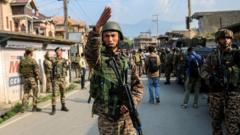With India's missile and air strikes targeting Pakistan's militant positions, experts are weighing the likelihood of Pakistani retaliation amidst a fragile political landscape, stirring fears of a broader conflict.
Rising Tensions: India-Pakistan Air Strikes Heighten Risks of Conflict

Rising Tensions: India-Pakistan Air Strikes Heighten Risks of Conflict
The recent air strikes by India on militant targets in Pakistan have triggered a wave of concerns regarding potential retaliation and the risk of escalation in the already tense South Asian region.
In an overnight operation that has sent shockwaves through South Asia, India carried out targeted missile and air strikes on nine alleged militant sites within Pakistan and Pakistan-administered Kashmir, followed by an alarming escalation in hostilities. The strikes, which took place between 01:05 and 01:30 India time (19:35 and 20:00 GMT), were reportedly based on "credible intelligence" regarding militant positions.
Pakistan reacted strongly to the air strikes, asserting they were limited to six locations and claiming to have shot down five Indian fighter jets, a statement India has yet to confirm. According to Islamabad, the strikes resulted in 26 fatalities and 46 injuries, while India reported that Pakistani shelling led to the deaths of 10 civilians on its side of the Line of Control (LoC).
This resurgence of violence comes in the wake of a recent militant attack in Pahalgam, Indian-administered Kashmir, which left several tourists dead and heightened existing tensions between the nuclear-armed neighbors. India claims the attack is linked to Pakistan-based terrorists, a connection denied by Islamabad.
Experts suggest that this particular response from India signifies a departure from previous engagement strategies. In contrast to earlier strikes which focused on Pakistan-administered Kashmir, this operation marks a broader scope targeting multiple militant infrastructures linked to groups such as Lashkar-e-Taiba (LeT) and Jaish-e-Mohammed across various regions including Punjab.
Observers point to the significant operational scale of the strikes and the potential for retaliation from Pakistan. Ajay Bisaria, a former Indian diplomat, characterized the operation as a "Balakot plus response" that aims to reinforce deterrence while also delivering a de-escalatory message. Nations across the region are now bracing for the possibility of imminent retaliation.
Some analysts predict that in the face of growing public sentiment and potential pressure from their military, Pakistan is likely to retaliate with its own military action. Observers suggest that both countries are now walking a precarious path, poised between retaliation and the need for diplomatic engagement to avoid spiraling into an unwanted and uncontrollable conflict.
Despite the pervasive dangers, there are persistent hopes among experts for diplomatic channels to de-escalate the situation, mirroring prior instances when tensions between India and Pakistan were alleviated through negotiations.
As both countries know all too well, the stakes are high and the room for miscalculation is razor-thin, leaving many to question whether they can step back from the brink of war once more. The developments in this ongoing crisis will be crucial in shaping the future of India-Pakistan relations and regional stability.






















